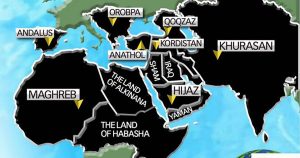ISIS is right on this point: the Dabiq battle was not the epic one for which it longs

ISIS’s map of the world
A basic fact about the battle for Dabiq, the northern Syrian town that ISIS has just lost: as the extremist group says, it was not the apocalyptic struggle between Muslims and non-Muslims allegedly prophesied by Prophet Mohammed.
ISIS is right. This was not that particular epic battle. The rebel groups who won Dabiq were not non-Muslim. One of the groups, for example, was the Hamza Brigade. It is a small, Pentagon-supported unit. The Hamza Brigade, the Sultan Murad Brigade and the Levante Front are on the same side as the US and Turkey. Larger, more hardcore Islamist groups such as the former Nusra Front are not included in that ragtag band that’s been cobbled together.
So to the extent that the Syrian fighters were not non-Muslim, the Dabiq battle is definitely not the one ascribed to the Prophet.
Whether the Prophet actually said it (many Hadith, or the Prophet’s sayings are disputed) is not clear. Whether such a big and conclusive clash between Muslim and non-Muslims can ever occur in Dabiq is even less obvious. Unless the US, the UK, Canada, France or a combined Nato force put boots on the ground in that part of Syria; unless they fought ISIS as one army against another, such an epic battle between Muslims and non-Muslims in Dabiq sounds highly unlikely.
But to ISIS, the notion of a coming clash has always been an attractive bit of historical re-invention and propaganda. It named its online magazine Dabiq to underline its determination to claim a grand and pivotal role in Islamic history.
To quote an article I wrote for The National last year, “if they were more cuddly ISIS might be called ‘the history boys’ of the radical extremist world, though they are nothing like the English schoolboys dolefully condemned to cramming dates, kings and battles in Alan Bennett’s fabulous play.”
They wanted to establish “Habasha”, an emirate that would be made up of present-day Sudan, Ethiopia, Somalia and Eritrea. The name “Habasha” is of enormous historical significance for Muslims because of the journey to the country by the Prophe’s followers in Islam’s early days.
Then there is “Barqa”, as eastern Libya was known after the 7th century Arab conquest. They once put out a map of the world with blocs that hark back to specific periods in 1,400 years of Muslim rule of the world – Andalus, Khorasan, Qoqaz, Anathol, Orobpa.
My article emphasized ISIS’s steady grasp of the longue duree, the long term. “The longue duree’s importance has been constantly stressed by the great French historian Fernand Braudel as the only way to make history usable for political purposes.
“In his massive account of the Mediterranean, published in the 1940s, Braudel was exceptionally careful not to confuse events with history. Events, he believed, were brief, rapid, nervous oscillations, the ‘froth’ on the waves of time. But history, he said, took place at much greater depths and iceberg-like, was often hidden from view. It has unseen consequences and makes connections at the level of ideas.”
By reaching into Islamic history – for names, prophesied battles and suchlike, ISIS wanted to make a grand narrative statement, a show-off embrace of a longer timescale, not of decades or centuries, but of millennia.
Losing Dabiq, the town if not the epic prophesied battle, doesn’t bode well for that.

